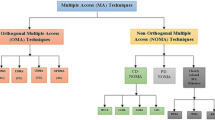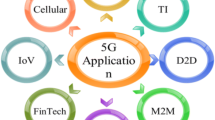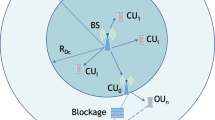Abstract
Error propagation seriously degenerate the diversity order of Decode-and-Forward (DF) cooperative communication. To address this problem, a novel Log Likelihood Ratio (LLR)-based Link Adaptive Relaying (LAR) is proposed to promote adaption accuracy at relay. The instantaneous Bit Error Probability (BEP) is calculated according to the LLR of the received signals firstly, then based on it, the equivalent Signal-to-Noise Ratio (SNR) is employed to operate dynamic power scaling by relay. It is theoretically proved that the full diversity order can be attained by the scheme. Besides, the power sensitivity is also analyzed. Simulation results show that the proposed scheme outperform the conventional LAR and can achieve full diversity order. Moreover, its strong adaptation to SNR fluctuation is validated.
Similar content being viewed by others
References
J. N. Laneman, T. Hunter, and G. W. Wornell. Cooperative diversity in wireless networks: efficient protocols and outage behavior. IEEE Transactions on Information Theory, 50(2004)12, 3062–3080.
J. N. Laneman and G. W. Wornell. Distributed space-time coded protocols for exploiting cooperative diversity in wireless networks. IEEE Transactions on Information Theory, 49(2003)10, 2415–2425.
A. Ribeiro, X. Cai, and G. B. Giannakis. Symbol error probabilities for general cooperative links. IEEE Transactions on Wireless Communications, 4(2005)3, 1264–1273.
E. Zimmermann, P. Herhold, and G. Fettweis. On the performance of cooperative diversity protocols in practical wireless systems. Proceedings of IEEE Vehicular Technology Conference (VTC’03), Orlando, FL, USA, October 6–9, 2003, 2212–2216.
T. Wang, A. Cano, G. Giannakis, et al.. High performance cooperative demodulation with decode-and-forward relays. IEEE Transactions on Communications, 55(2007)7, 1427–1438.
G. Kramer, M. Gastpar, and P. Gupta. Cooperative strategies and capacity theorems for relay networks. IEEE Transactions on Information Theory, 51(2005)9, 3037–3063.
I. Krikidis. Relay selection for two-way relay channels with MABC DF: a diversity perspective. IEEE Transactions on Vehicular Technology, 59(2010)9, 4620–4628.
W. Guan and K. J. Liu. Performance analysis of two-way relaying with non-coherent differential modulation. IEEE Transactions on Wireless Communications, 10(2011)6, 2004–2014.
M. Elfituri, W. Hamouda, and A Ghrayeb. A convolutional-based coded cooperation scheme for relay channels. IEEE Transactions on Vehicular Technology, 58(2009)3, 655–669.
M. Xiao and M. Skoglund. Multiple-user cooperative communications based on linear network coding. IEEE Transactions on Communications, 58(2010)12, 3345–3351.
F. Onat, A. Adinoyi, Y. Fan, et al.. Threshold selection for SNR-based selective digital relaying in cooperative wireless networks. IEEE Transactions on Wireless Communications, 7(2008)11, 4226–4237.
G. Harbian, A. Ghrayeb, M. Hasna, et al.. Threshold-based relaying in coded cooperative networks. IEEE Transactions on Vehicular Technology, 60(2011) 1, 123–135.
A. Nasri, R. Schober, and M. Uysal. Error rate performance of network-coded cooperative diversity systems. Proceedings of IEEE Global Communications Conference (GLOBECOM’10), Miami, FL, USA, December 6–10, 2010, 1–6.
M. Selvaraj, R. Mallik, and R. Goel. Optimum receiver performance with binary phase-shift keying for decode-and-forward relaying. IEEE Transactions on Vehicular Technology, 60(2011)4, 1948–1953.
M. Iezzi, M. Renzo, and F. Graziosi. Closed-form error probability of network-coded cooperative wireless networks with channel-aware detectors. Proceedings of IEEE Global Communications Conference (GLOBECOM’11), Houston, TX, USA, December 5–9, 2011, 1–6.
W. Guan and K. Liu. Mitigating error propagation for wireless network coding. IEEE Transactions on Wireless Communications, 8(2012)3, 205–217.
I. Gradshteyn and M. Ryzhik. Table of Integrals, Series and Products. 7th edition, Academic Press, USA, 2007, 348.
Author information
Authors and Affiliations
Corresponding author
Additional information
Supported by the National Natural Science Foundations of China (No. 61071090, No. 61171093), the Postgraduate Innovation Programs of Scientific Research of Jiangsu Province (CXZZ11_0388, CXLX11_0404), Jiangsu Province Natural Science Foundation Key Projects (11-KJA510001), National Science and Technology Key Projects (2011ZX03005-004-003), and Jiangsu 973 Projects (BK2011027).
About this article
Cite this article
Cheng, Y., Yang, L. LLR-aware smart link-adaptive strategy for decode-and-forward cooperative communication. J. Electron.(China) 30, 175–182 (2013). https://doi.org/10.1007/s11767-013-2162-y
Received:
Revised:
Published:
Issue Date:
DOI: https://doi.org/10.1007/s11767-013-2162-y
Key words
- Cooperative communication
- Adaptive transmission
- Log Likelihood Ratio (LLR)
- Diversity order
- Power efficiency




